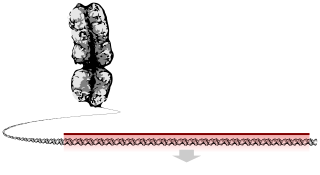
Olfactory receptor 10W1 is a protein that in humans is encoded by the OR10W1 gene.

Olfactory receptor 2L13 is a protein that in humans is encoded by the OR2L13 gene.

Transmembrane protein 51 is a protein in humans that is encoded by the TMEM51 gene.

Olfactory receptor, family 6, subfamily C, member 75 is a protein in humans that is encoded by the OR6C75 gene.

Transmembrane protein 151B is a protein that in humans is encoded by the TMEM151B gene.

Transport and Golgi organization protein 6 homolog also known as transmembrane and coiled-coil domain-containing protein 7 is a protein that in humans is encoded by the TANGO6 gene.

Transmembrane protein 215 is a protein that in humans is encoded by the TMEM215 gene.

Interferon-induced transmembrane protein 2 is a protein that in humans is encoded by the IFITM2 gene.

Transmembrane protein 196 is a protein that in humans is encoded by the TMEM196 gene.

Transmembrane protein 109 is a protein that in humans is encoded by the TMEM109 gene.

Osteoclast stimulatory transmembrane protein is a protein that in humans is encoded by the OCSTAMP gene.

Transmembrane protein 176B is a protein that in humans is encoded by the TMEM176B gene.

Transmembrane protein 72 is a protein that in humans is encoded by the TMEM72 gene.

Transmembrane and immunoglobulin domain containing 1 is a protein that in humans is encoded by the TMIGD1 gene.

Fibronectin leucine rich transmembrane protein 1 is a protein that in humans is encoded by the FLRT1 gene.

Transmembrane protein 182 is a protein that in humans is encoded by the TMEM182 gene.

Lysosomal protein transmembrane 4 alpha is a protein that in humans is encoded by the LAPTM4A gene.

CKLF like MARVEL transmembrane domain containing 6 is a protein that in humans is encoded by the CMTM6 gene.

Transmembrane protein 94 is a protein that in humans is encoded by the TMEM94 gene.

Fat storage inducing transmembrane protein 1 is a protein that in humans is encoded by the FITM1 gene.


















